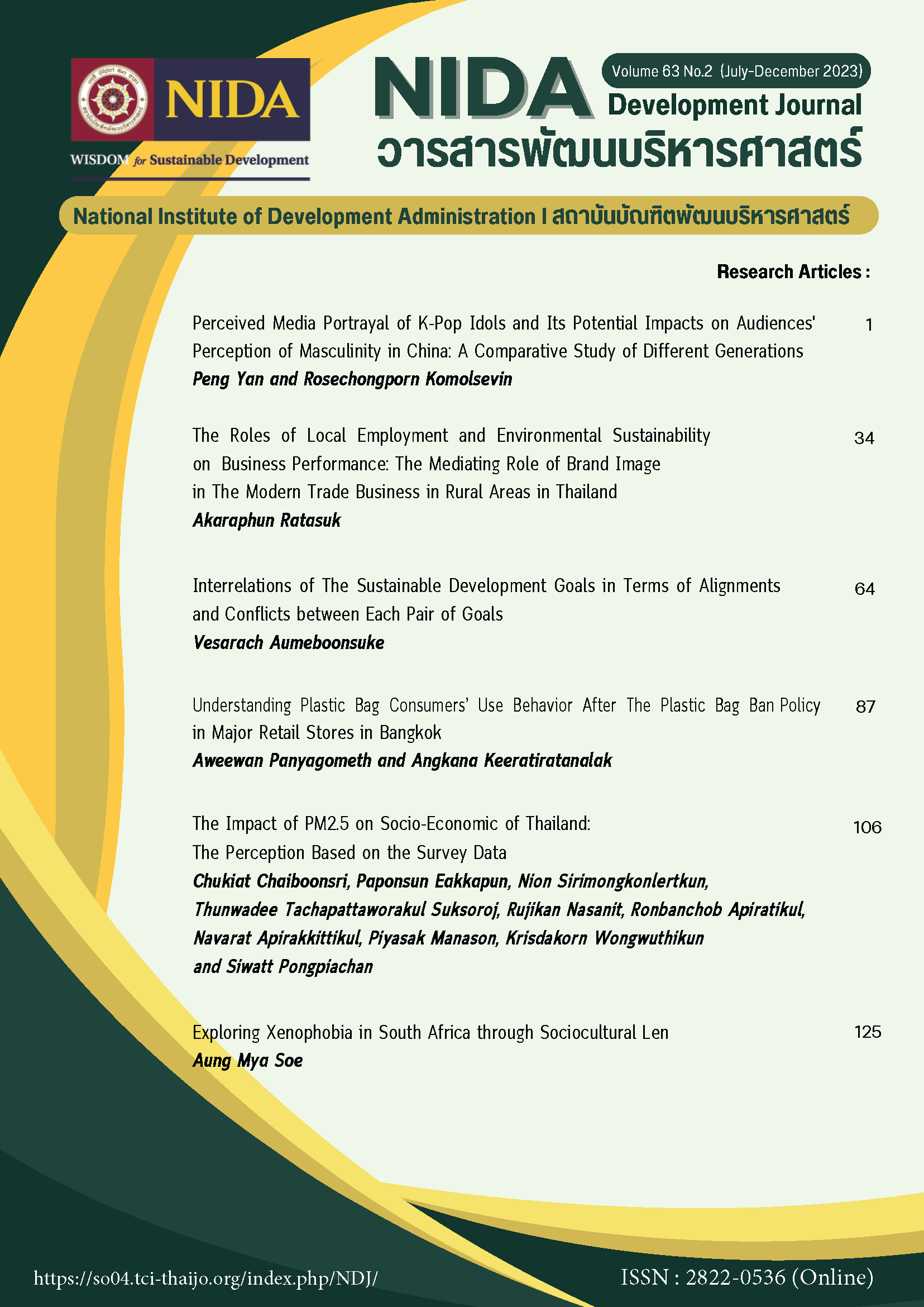Perceived Media Portrayal of K-Pop Idols and Its Potential Impacts On Audiences' Perception Of Masculinity In China: A Comparative Study Of Different Generations
DOI:
https://doi.org/10.14456/ndj.2023.1Keywords:
K-pop Idol, Perceived Media Portrayal, Perception of MasculinityAbstract
The proliferation of K-pop culture has sparked controversy in China over its impact on the perception of masculinity, therefore the Chinese government has banned all K-pop content on TV and social media. This research intends to investigate the perceived media portrayal of masculinity by K-pop idols on TV/online TV and its impact on the perception of masculinity by two generations: Millennials and Generation Z and compare the difference between them. This study adopted the quantitative approach and surveyed with an online questionnaire due to Covid-19. As many as 425 valid results were collected from respondents of both Millennials and Generation Z groups. The data collected were utilized to test the hypotheses on SPSS. Hypothesis 1 was tested with linear regression analysis and hypothesis 2 with independent sample t-test. The findings show a significant difference between Millennials and Generation Z in the perception of masculinity under the impact of the perceived portrayal of masculinity by K-pop idols on TV/online TV in China. Millennials strongly agreed with the impact while Generation Z disagreed. The findings of this study could serve to improve the regulations on intercultural communication activities in China. It is recommended to proceed with ongoing comparative studies on the perception of masculinity between the current target audience and the coming younger generation to draw a better conclusion about the cultural trends in China
References
Blue Rain. (2001). 哈韩有哈韩的道理 [There are reasons for hahan]. 轻音乐全日韩./Cool Music, 18, 28.
Brannon, R., & Juni, S. (1984). A scale for measuring attitudes about masculinity. Psychological Documents, 14, 6 –7.
Cheng, X. (2021, May 9). Lu Han said makeup not limited to a specific gender. Netease Entertainment. Retrieved from https://www.163.com/ent/article/G9JIQJOJ00038FO9.html.
Cole, N. L. (2020, January 6). How the Ruling Class Maintains Power Using Ideas and Norms. ThoughtCo. https://www.thoughtco.com/cultural-hegemony-3026121
Dal, Y. J. (2013, March 1). Hallyu 2.0: The new korean wave in the creative industry. International Institute Journal. Retrieved from https://quod.lib.umich.edu/i/iij/11645653.0002.102/--hallyu-20-the-new-korean-wave-in-the-creative-industry?rgn=main%3Bview.
Dazui. (2001). 内地制造”韩流”第一人——司捷 [Si Jie: The first person who made “Hallyu” in the Mainland]. 轻音乐全日韩/Cool Music, 24, 20.
Doujiao. (2001). 我们为什么爱上流感? [Why we fall in love with the flu?] 轻音乐全日韩/Cool Music, 12, 16.
Hawkins, A. C. (2019, October 23). CIA turned our celebrities into ‘sissy pants’, says Chinese Academy of Social Sciences. World | The Times. https://www.thetimes.co.uk/article/cia-turned-our-celebrities-sissy-says-beijing-sl8p8klfr
Jourdan, A. J. L. (2017, March 17). Missile row drives Korean culture underground in China. Reuters. https://www.reuters.com/article/us-southkorea-china-culture-idUSKBN16O0I0
Li, L., & Kuang, C. (2021, June 11). Shifting sands: Masculinity in China: Marketing. Campaign Asia. Retrieved from https://www.campaignasia.com/article/shifting-sands-masculinity-in-china/469581.
Lifshitz, H. (2000). Conceptualization of Age and Aging by Adolescents, Adult and Elderly People with Mental Retardation. Education and Training in Mental Retardation and Developmental Disabilities, 35(4), 374–383. http://www.jstor.org/stable/23879861
May, T. (2021, September 6). China’s Weibo Suspends BTS, Blackpink and EXO Fan Accounts. The New York Times. https://www.nytimes.com/2021/09/06/business/china-bts-kpop-fans.html
Morin, N. (2020, May 12). K-pop's beautiful men are breaking the rules of masculinity, but can america handle it? What Male K-Pop Stars Teach Us About Masculinity. Retrieved from https://www.refinery29.com/en-us/2020/05/9674149/kpop-male-singers-masculinity.
NetEase Entertainment. (2012). 司捷:组合文化将和选秀市场分天下(全文) [Si Jie: Group culture and talent shows will divide the market (full text)]. Retrieved from http://ent.163.com/12/1228/15/8JQQLE2R00031H0O_all.html
Piao, G. (2011). 韩流的文化启示——兼论韩流对现代社会生活方式的影响及其文化根源[Cultural enlightenment of Korean wave -- Also on the influence of Korean wave on modern social life style and its cultural roots]. 国外社会科学(04),98-104. doi:CNKI:SUN:GWSH.0.2011-04-023.
Piao, G. (2016). 论中国人看待韩流的文化心理[On the Chinese People’s Cultural Mentality Towards the Korean Wave]. 当代韩国(04),76-86. doi:CNKI:SUN:DDHG.0.2016-04-007.
Shiau, H., & Chen, C. (2016). When Sissy Boys Become Mainstream: Narrating Asian Feminized Masculinities in the Global Age.
Sun, M., & Liew, K. K. (2019). Analog Hallyu: Historicizing K-pop formations in China. Global Media and China, 4(4), 419–436. https://doi.org/10.1177/2059436419881915
TNEC News Desk. (2021, July 28). K-drama to K-pop; will this Hallyu be the no. 1 reason for cultural manifestation. The North-Eastern Chronicle. Retrieved from https://northeasternchronicle.in/news/will-hallyu-be-the-no-1-reason-for-cultural-manifestation/.
Wang, F. (2017, December 14). “限韩令”下的韩流产业能否重回中国市场?[Can the Hallyu Industry Under the "Korea Restriction Order" Return to the Chinese Market]. BBC News 中文. https://www.bbc.com/zhongwen/simp/chinese-news-42319225
Yi, D. (2020, April 15). How K-pop changed the meaning of masculinity in South Korea. Allure. Retrieved from https://www.allure.com/story/k-pop-and-masculinity.
Zheng, X. (2008).“韩流”成因及对我国青少年的影响[Cause of "South Korean Tide" and Its Influence on Chinese Youth.]. 中国青年研究(02),97-99. doi:10.19633/j.cnki.11-2579/d.2008.02.022.
Downloads
Published
How to Cite
Issue
Section
License
Copyright (c) 2023 NIDA Development Journal

This work is licensed under a Creative Commons Attribution-NonCommercial-NoDerivatives 4.0 International License.





